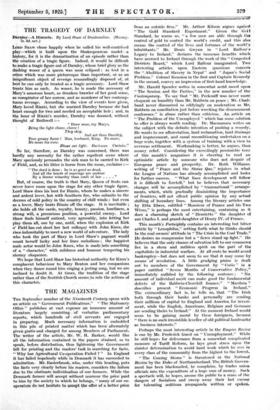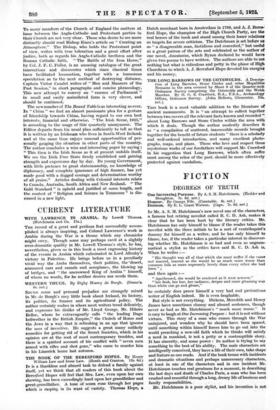THE MAGAZINES
THE September number of the Nineteenth Cenfurg.opens with an article on " Government Publications." " The Stationery Office " publishes at vast expense an immense amount of literature largely consisting...of verbatim parliathentary reports, which hundreds of , civil servants are engaged in preparing. Much necessary information is embedded in this pile of printed matter which has been alternately given gratis-and charged for among Members of Parliament The writer of the article, Mr. W. R. Barker, would like all the information contained in the papers strained, so to speak, before distribution, thus lightening the Government bill for printing and the readers' task in searching for facts. " Why has Agricultural Co-operation-Failed ? " In England it has failed hopelessly while in Denmark it has succeeded to admiration.- Mr. Easterbrook, who, under this heading, puts the facts very clearly before his readers, considers the failure due to the obstinate individualism of our farmers. While the Denmark farmer will accept :without murmur the price' paid to him by the society to which he belongs, " many of our co- operatox§ do not hesitate to accept the offer of a better price
from an outside firm." Mr. Arthur Kitson argues again4 " The Gold Standard Experiment." Given the Gcii Standard, he warns us, " a few men are able through the control of gold td control the world's credit, and this also means the control of the lives and fortunes of the world's inhabitants." Mr. Denis Gwynn in Lord Balfour's Legacy to Ireland," declares the immense benefits which have accrued to Ireland through the work of the " Congested Districts Board," which Lord Balfour inaugurated. Two interesting articles upon Eastern questions concern the Abolition of Slavery in Nepal" and " Japan's Social Problem." Colonel Kennion in the first and Captain Kennedy in the second, convey an impression of first-hand knowledge.
Mr. Harold Spender writes in somewhat acrid mood upon " The Session and the Parties," in the new number of the Contemporary. To say that Mr. Pecksniff was never more eloquent on humility than Mr. Baldwin on peace ; Mr. Chad- band never discoursed so edifyingly on moderation as Mr. Baldwin on conciliation just before wrecking the disarmament conference," is abuse rather than criticism. An article on The Problem of the Unemployed which has some solution to offer is always worth reading. Dr. Macnamara writes on the subject with the definite intention of pushing a remedy. He wants to see afforestation, land reclamation, land drainage and improvement, and canal reconditioning undertaken on a huge scale, together with a system of training with a view to overseas settlement. Worlunaking is better, he argues, than money relief. Considering the exceedingly pessimistic tone of this month's magazines it is cheering to read an optimistic article by someone who does not despair of European peace and prosperity. Dr. Roth Williams, writing of " Peace and the Status Quo," rejoices in what the League of Nations has already accomplished- and looks for further success. " What lines development will follow it is difficult to foretell," but he believes that necessary changes will be accomplished by " transnational " arrange- ments, which, while gradually diminishing the importance of frontiers, will not offend public opinion by any actual shifting of boundary lines. Among the literary articles one by Etta Elwes, entitled " Monsieur of France and his Two Wives," is perhaps the most entertaining, containing as it does a charming sketch of " Henriette " the daughter of our Charles I. and grand-daughter of Henry IV. of France.
This month's Fortnightly contains an interesting but bitter article by " Lexophilus," setting forth what he thinks should be the coal owners' attitude in " The Crisis in the Coal Trade." He desires no compromise but a " fierce stand up fight." He believes that the only chance of salvation left to our commerce lies in a stern and ruthless spirit on the part of the capitalists in industrial warfare. At all costs he would avoid bankruptcy—but does not seem to see that it may come by means • of revolution. A little grudging praise is dealt out to members of the Government by " Curio " in a paper entitled " Seven Months of Conservative Policy," immediately nullified by the following sentence : " No amount of individual merit can make good the fundamental defects of the Baldwin-Churchill finance." " Macdara " describes present " Economic Progress in Ireland." The extraordinary fact is, he tells us, that " The Irish both through their banks and personally arc sending their millions of capital to England and America for invest- ment, while the English, Americans, Belgians and Germans are sending theirs to Ireland." At the moment Ireland would seem to be gaining moral by these foreigners, because " there is no such irresistible leveller of old political landmarks' as business interests."
Perhaps the most interesting article in the Empire Review
is one by Mr. Frederick Guest on " Unemployment." While he still hopes for deliverance from a somewhat complicated measure of Tariff Reform, he lays great stress upon the
sinister determination to avoid hard work which he sees in every class of the community from the highest to the lowest. The Coming Storm " is threatened in the National Review by the Duke of. Northumberland. The: British Govern-
ment has been blackmailed, he complains, by trades union officials into the expenditure of a huge sum of money. Such a spectacle will, he hopes, arouse the public to a sense of the dangers of Socialism and sweep away their last excuse for tolerating Seditious propaganda written or spokei. To many members of the Church of England the matters at issue between the Anglo-Catholic and Protestant parties in their Church are not very clear. Those who desire to see more distinctly should read Bishop Knox's article on " Creating an Atmosphere." The Bishop, who holds the Protestant point of view, writes with true toleration and a great effort after justice, both as regards his Anglo-Catholic brethren and the Roman Catholic, faith. " The Battle of the Iron Horse," by Col. J. F. C. Fuller, is an amusing catalogue of the great innovations and discoveries which since classical times have facilitated locomotion, together with a humorous speculation as to the next method of destroying distance. Captain Victor Cazalet writes of " Men and Manners of the Past Session," in short paragraphs and concise phraseology. This new attempt to convey an " essence of Parliament " in small and easily assimilated form is very clever, and should be continued.
The new number of The Round Table is as interesting as ever. In " China " we find an almost passionate plea for a gesture of friendship towards China, having regard to our own best interests, financial and otherwise. " The Irish Scene, 1925," is according to the usage of this quarterly anonymous. The Editor departs from his usual plan sufficiently to tell us that it is written by an Irishman who lives in South-West Ireland, and at the same time enjoys unusual opportunities of per- sonally gauging the situation in other parts of the country. The author concludes a wise and interesting paper by saying : " This then is the Irish Scene as it at present unfolds itself. We see the Irish Free State firmly established and gaining strength and experience day by day. Its young Government, with little pretence to great statesmanship, no knowledge of diplomacy, and complete ignorance of high finance, has yet made good with a dogged courage and determination worthy of all praise." Articles dealing with Colonial interests relate to Canada, Australia, South Africa and New Zealand. " The Gold Standard " is upheld and justified at some length, and the contest of " Religion and Science in Tennessee " is dis- cussed in a new light.











































 Previous page
Previous page